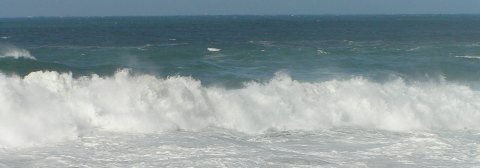Home | About CCW | Contact Us | Climate change Meaning | Causes | Solutions | Emissions | Carbon trading
Ocean currents and climate change
Ocean currents are a huge moderator of local and global climate.
The thermal mass and shear volume of ocean waters means that huge amounts of energy are absorbed from incoming solar radiation. Then on slow but effective cycles the water moves this energy around the planet.
As a large landmass at high latitude, western Europe should be extremely cold in winter.
Instead the climate is mollified by the warm surface waters of the Gulf stream. This creates a moist and seasonally benign climate ideal for plant growth.
Siberia, that has no such ocean circulation nearby, consistently reaches -30 degrees C in winter. Warmer waters also release moisture to the atmosphere. Hence western Europe also receives more rainfall than Siberia.

Catastrophic change to climate is predicted if these ocean heat conveyors slow or falter.
This was the premise of the 2004 disaster movie The Day After Tomorrow where global warming leads to a breakdown in ocean circulation, an abrupt cooling and an immediate ice age.
Artistic license may have shortened the timeframe, but the scientific climate models say this magnitude of change is possible.
Reality is that the energy from the sun will not be switched off. So even if currents falter under warming scenarios, they are more likely to shift location than stop altogether.
The climate models are unclear as to how much the pattern of ocean currents may change, or when or how fast. This is not an easy prediction to make given the scale and thermal inertia of the oceans. Instead the models focus on other global warming effects
Where water is warmer there is more evaporation, more moisture in the lower atmosphere and where the air mass hits land, more rain. In tropical regions the frequency and intensity of cyclones and sever weather can increase. The opposite applies where the surface water becomes cooler.
The challenge is that the specifics are difficult to determine.
Should currents shift there will also be redistributions of marine life. The zones of upwelling, where the cooler and nutrient rich bottom water rise to the surface, are hotspots of productivity in the seas and oceans. Often they are important fishing grounds for larger sea creatures and humans alike.
Changes to patterns of marine productivity will mean as much to us as climate change effects.

Oceans warrant serious climate change attention. Instead most of the scientific research has been on the atmosphere and specifically effects of greenhouse gas emissions reduction.
This is perhaps more to do with human limitations than logic. We are not marine creatures, cannot survive at depth under water and so do not spend much time in the sea.
Our knowledge of marine life and habitats is sketchy, matched only by our limited understanding of the biology in soil and the canopies of rainforests. Bar the exploits of a few adventurers and explorers, we have not been good at seeking knowledge of things and places that are distant.
We also like to tackle things that we believe we can fix. Often having first made the presumption that the thing or issue needs fixing. Hence greenhouse gas emissions. These, we insist, are fixable and in need of fixing.
Even if we wanted to, we would have trouble fixing an ocean current and so we have not given them as much attention.
Perhaps, as the movie suggests, we should consider them more closely.
Back to top of ocean currents | Return from Ocean currents to climate change effects | Back to climate-change-wisdom home page
Recent Articles
-
Reducing emissions while looking for solutions...
Nov 01, 15 04:46 PM
I've seen a lot of post's online for ideas on reducing emissions. The one suggestion I have not seen, is the most obvious. There should be a government -
Climate change evidence
Mar 24, 15 06:22 AM
Real climate change evidence has to demonstrate a change in climate. An extra sunny day or a severe storm or a flood is not enough. -
The climate change effect
Feb 19, 15 03:08 AM
What will be the climate change effect? There isn't one, there are many. Perhaps too many for us to understand.

New! Comments
Have your say about what you just read! Leave me a comment in the box below.